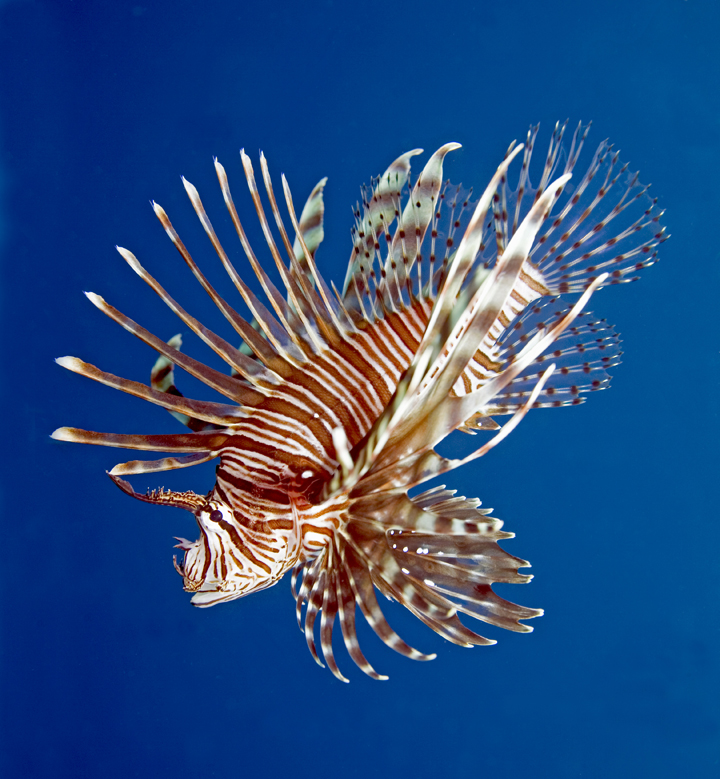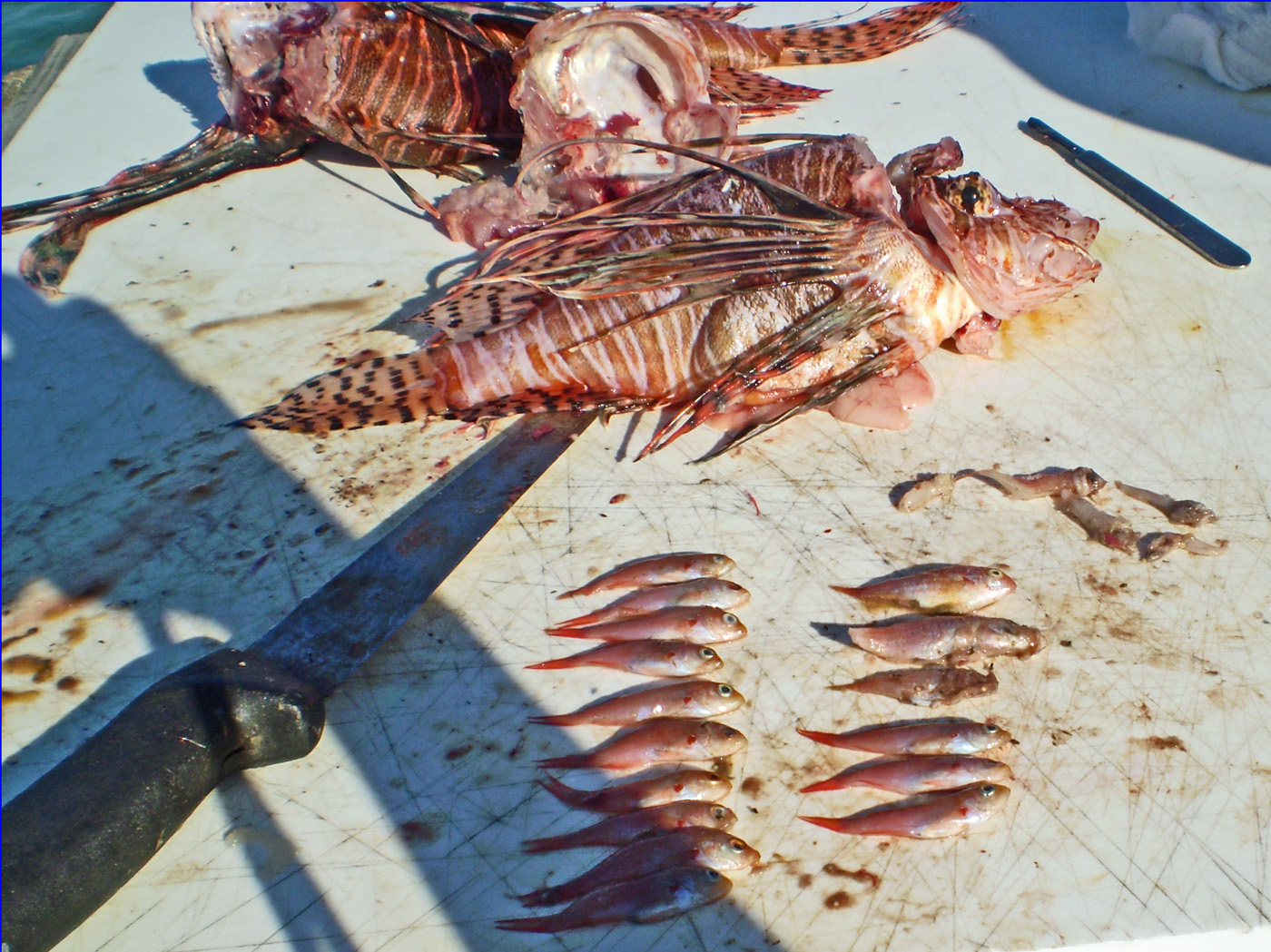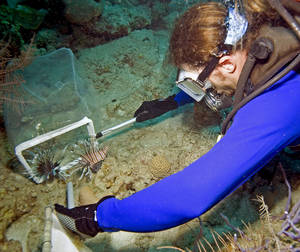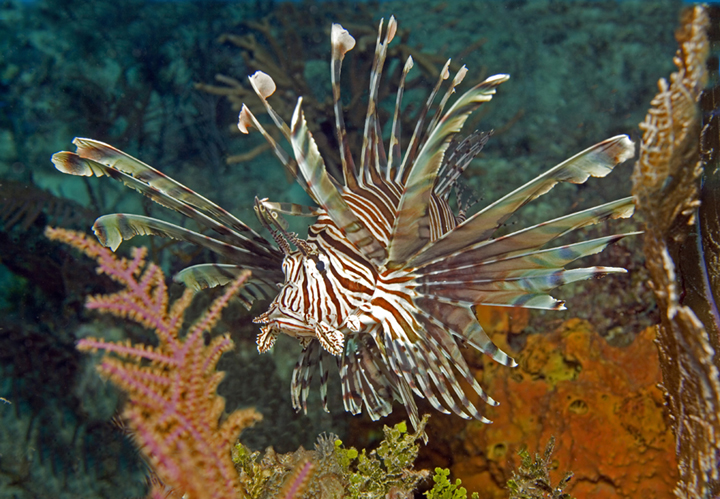Tackling the problem of lionfish
Interview with

Helen - Lionfish are beautiful but venomous fish that are native to reefs in the Indian and Pacific Oceans. They're also popular aquarium pets and it's thought that releases, either accidentally or perhaps on purpose, led to their introduction on the other side of the world.
Chris - One of the first reports of lionfish in the Atlantic dates back to the late 70s early 80s, and it was an anecdotal observation, somebody had seen one of these off the coast of Florida and nobody believed it.
Helen - That's Chris Flook from the Ocean Support Foundation in Bermuda.
Chris - Then in 1992 there was a confirmed accidental release after Huricane Andrew in the Biscagne Bay area or about 5-6 lionfish. People went there and took pictures and said, Oh that's beautiful, lionfish in the Atlantic, oh they're not really going to do much damage. Nobody knew or even predicted all that they would do as much damage as they have.
Helen - There are nine species of lionfish, and there are two that have become established in the Caribbean- Pterois volitans and Pterois miles.
Chris - What's really interesting is that everything north of Florida is both species, the volitans and miles. Everything south of the Bahamas seems to be mostly volitans which makes the researchers believe that basically there were potentially two points of the invasion, one off Florida because of the two species and one south of Florida which is just the volitans. To this point I believe everyone south of the Bahamas, from Curacao down to Colombia, Mexico and all that are all volitans.
Helen - Lionfish have also reached much further north, to Bermuda way out in the Sargasso sea, 1000km off the United States eastern seaboard. It was Chris Flook who reported spotting one in the water in Bermuda, ten years ago. Back then he was the head collector for the Bermuda aquarium and he noticed something was wrong at one of his top collecting spots ...
Chris - So the one year I went and all of a sudden I was very aware there were a lot less fish than usual. It raised some concerns to me and as I turned the corner, sure enough there was a lionfish. So I caught the lionfish brought it in and we starting figuring where this thing came from because Bermuda's so far out in the middle of nowhere it's not that we imported the fish, it's obviously come from somewhere else.
Helen - The major problem with lionfish getting established in the Caribbean is that they have really big appetites, and as soon as they set up home on a new reef they very quickly start munching their way through the native fish species.
 Chris - Where they're from in the Pacific they've been programmed over millions of years to eat as much as they can whenever they can. Because the fish there see them as a threat, they've got to work really hard to eat, because they might not eat tomorrow. The fish in the Atlantic don't see them as a threat.
Chris - Where they're from in the Pacific they've been programmed over millions of years to eat as much as they can whenever they can. Because the fish there see them as a threat, they've got to work really hard to eat, because they might not eat tomorrow. The fish in the Atlantic don't see them as a threat.
We did some early experiments when we first started seeing them here. I took a little lionfish and put him in one tank and I took a little black grouper from off the coast here in another tank. And I took some juvenile baitfish out of an enclosed bay that had never seen a grouper and put them in the tank with the grouper and they knew they had to stay away from that grouper because they knew that at some point that grouper would eat them. And then we put the small fish into the tanks with the lionfish and they actually swam up to the lionfish to try and hide next to him. And he ate every single one.
When you look head on at a lionfish it looks very similar to the soft corals that we have in tne Atlantic, so the fish haven't picked it up as a threat yet. They know groupers, they know sharks, they know bigger threats are threats. But just the way a lionfish looks, looking more like something they would want to hide in.
Every single lionfish that I've necropsied from Bermuda, Florida, through the Caribbean, every single one has fatty liver disease. Now, fatty liver disease is a classic captive problem and the fact that you're overfeeding them and the fish isn't working hard enough to get its food. So to see every single lionfish from the wild and cut open have fatty liver disease is very telling and the fact that they're just gorging.
Helen - Studies are showing just how much of an impact lionfish can have on Caribbean reef fish. In the Bahamas, a 5-week experiment showed that lionfish can reduced native juvenile fish by 79%. And one large lionfish has been observed eating 20 young fish in half an hour.
And one of the keys to the successful invasion of the Atlantic by lionfish is their immense reproductive captivity.
Chris - the females will dump 30,000 eggs every spawning cycle. Those eggs after about 30-40 days settle out as baby fish on the reef. And by about 6-7 months old they're old enough to spawn. The quick turnaround on the fish in terms of the spawning cycles have just made the population really boom.
Helen - And it's those eggs that Chris thinks invaded Bermuda from further south in the Caribbean:
Chris - The egg mass that the females dumps, not individual eggs or individual larval fish, what it is, it's a big gooey gelatinous ball that floats around or a couple of days before these fish hatch out. So with that gooey ball floating to the surface and floating around for a few days before they hatch, the ones that are spawning here close to shore, the potential is that the larval fish can't make it to shore but a few of them I'm sure are getting pushed out into the deep and further north in the cold and don't actually make it to adulthood. But there's not much doubt in my mind that all the breeding fish that are down in the Caribbean just because there are so many of them, for sure some of those eggs masses are making it to us.
Helen - And with the lionfish in the Atlantic eating so much, they're growing bigger and producing even more fish than they do in the Pacific.
Chris - In their native range they get to 13 inches or so. We've had them as big as 18 in the Atlantic.
Helen - After researching these fish and learning more about their ability to munch their way through native fish populations, Chris and his colleagues convinced the Bermuda government to try and tackle the problem of lionfish in Bermudian waters.
They came up with a plan to catch as many lionfish as possible - and the task force they've enlisted is made up local scuba divers.
 Chris - They're fairly easy to catch. They really are bold and brave. They know that they have venom and nothing's going to eat them. There's two ways that we target them diving here. In most places I've been they do they same thing. They have some sort of small spear, that allows the diver to get up to the fish and whack him without getting too close. My personal favourite is using little collecting nets, little hand nets. With the fishermen, some guys are catching them on hook and lines, what I tell guys is when you get them in the boat just put it on ice and leave it til its dead, once it's dead just cut the top fins off, cut the bottom fins off and treat it like any other fish.
Chris - They're fairly easy to catch. They really are bold and brave. They know that they have venom and nothing's going to eat them. There's two ways that we target them diving here. In most places I've been they do they same thing. They have some sort of small spear, that allows the diver to get up to the fish and whack him without getting too close. My personal favourite is using little collecting nets, little hand nets. With the fishermen, some guys are catching them on hook and lines, what I tell guys is when you get them in the boat just put it on ice and leave it til its dead, once it's dead just cut the top fins off, cut the bottom fins off and treat it like any other fish.
Helen - They are also working on novel ways of selectively trapping lionfish, while leaving other fish alone. One approach is to put some bait fish in a glass jar inside the trap to attract the predatory lionfish, and the other idea takes advantage of the fact that lionfish are social animals:
Chris - We're also using high resolution pictures of lionfish so that the lionfish will see them, see there's a group of them in there and want to go hang out. None of the other fish want to come and take a look at a picture of a lionfish but lionfish do for some reason. So, we're still in the early stages and working out the kinks in it but there is quite a bit of promise so far with it.
Helen - And the good news is that in areas where there's not too great a risk of ciguatera poisoning - a disease that people can catch by eating predatory fish in some tropical countries - then lionfish are really good to eat, even though they have venomous spines.
Chris - It's a true protein-based venom, it's not a toxin or a poison. And in heating the venom will denature so its inert. That's why if people are stung we say the first thing we do is put your hand or wherever you've been stung in as warm water without burning yourself. But for cooking, you can take a whole fish, as is, throw it in a frying pan, cook it all the way through, there's absolutely nothing on the fish you can't eat.
So the campaign Chris launched was called "Eat 'em to beat 'em"
Chris - I've always look at the lionfish issue as we need to make lemonade from  lemons. We have this issue with lionfish in the Atlantic now, humans have caused it, there's no doubt there. But you know the seafood watch cards where you've got a green choice, a yellow choice and a red choice? The green choice is the best option, the yellow choice we should avoid and red choice we should definitely avoid. Those are all managed fisheries. With lionfish if we could start a commercial fishery for them, it's a greener than green choice. Because we're not removing healthy genetics from a managed fishery because we want to remove all of them. By targeting them as a food fish a) they're not out there eating, b) they're not out there spawning, they're not competing against the other native fish, but then also we're not pressuring the grouper and snapper species that aren't doing as well as we think they are. So there is some hope there if we can make a commercial fishery out of them.
lemons. We have this issue with lionfish in the Atlantic now, humans have caused it, there's no doubt there. But you know the seafood watch cards where you've got a green choice, a yellow choice and a red choice? The green choice is the best option, the yellow choice we should avoid and red choice we should definitely avoid. Those are all managed fisheries. With lionfish if we could start a commercial fishery for them, it's a greener than green choice. Because we're not removing healthy genetics from a managed fishery because we want to remove all of them. By targeting them as a food fish a) they're not out there eating, b) they're not out there spawning, they're not competing against the other native fish, but then also we're not pressuring the grouper and snapper species that aren't doing as well as we think they are. So there is some hope there if we can make a commercial fishery out of them.
Helen - Lionfish eradication programmes are being rolled out across their new range - if you're a diver, watch out for lionfish catching derbies if you ever visit the Caribbean.
And time will tell how well lionfish fisheries will take off to help control the invasion and minimise the impact on native species, but as Chris points out, lionfish are probably in the Caribbean for good.
Chris - for me it's never been an eradication issue it's always been a management issue because to think that we're going to remove every single one of these lionfish is a complete pipe dream.
Find out more:
Ocean Support Foundation
REEF Lionfish Programme










Comments
Add a comment